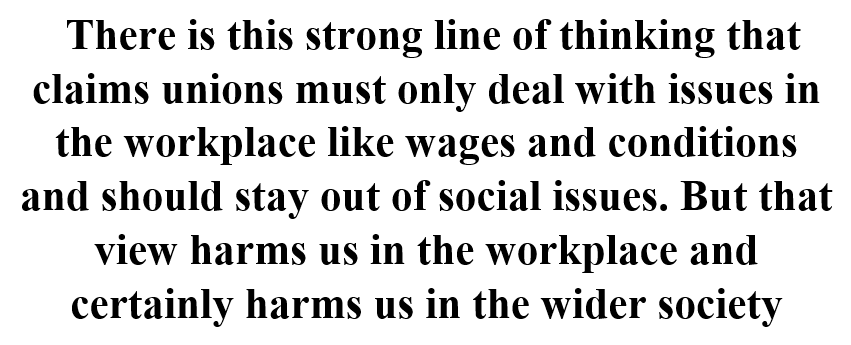By Richard Mellor in California, retired AFSCME union member
We stand for the right of women to choose not to have their baby if this is their decision. We stand for this to be their decision and their decision alone.
We stand for a free national health care system within which they can have the benefit of the best and most modern treatment if they choose to have an abortion.
We also stand for the right of women to choose to have their child if that is their decision. The right to choose means to choose to not have a baby or to have a baby. The right to choose to have a baby means the right to a well-paid job with full health care benefits, a decent and affordable place to live and free on sight childcare at work, school and home.
It is these two choices, the right not to have a baby and the right to have a baby that go together to make the real and full right to choose.
Blue-collar union local democratically run
I was an active rank and file member of my union for many years. I belonged to a blue collar local in Oakland California, Local 444, affiliated to the American Federation of State, County and Municipal Employees (AFSCME). As a socialist in a trade union, I didn’t always get my way, but Local 444 was a democratic union local and I played my part in introducing issues that were important to all workers.
Local 444 supported imprisoned trade unionists in countries where being a union activist could and did cost you your life; we took up housing issues, racism, police brutality and many more working-class issues as well as giving solidarity support to any workers on strike that needed it.
It wasn’t always easy, and we had healthy debates on the floor about why we should take this or that position on an issue that some argued did not affect us at work; I miss those days. There is this strong line of thinking that claims unions must only deal with issues in the workplace like wages and conditions and should stay out of social issues. But that view harms us in the workplace and certainly harms us in the wider society.
Campaign against domestic violence
I was involved in a campaign against domestic violence during the 1980s and brought this issue in to my workplace and local meeting asking for support for the campaign. I got some resistance on the basis that this wasn’t a job issue.
As a blue-collar union, given the historical exclusion of women from this work and especially the trades, our local was predominantly male but some of our best activists were women. When I first got involved, our chief steward was a woman and there were numerous women shop stewards in other departments. During my active period we had two women presidents, one was a lesbian which at that time was quite rare in a blue-collar union of this nature I would guess. I am honoured to be part of this union local’s history.
Issues allegedly ‘out of our jurisdiction’
The issue of domestic violence was becoming more prominent as, more often than not, the state did not protect the victims adequately or heed their concerns. If a woman called the police on an abuser, she could lose her life. When I got opposition to the local making any statement about it, it wasn’t necessarily because of misogyny, not conscious anyway, people simply thought it was beyond our scope as an organization.

I remember making my arguments to this opposition on the basis of it being ‘out of our jurisdiction’ so to speak. I approached it not from a moral viewpoint because the average person would agree domestic violence is immoral. I made it a class issue, a union issue. Despite age-old prejudices that women had to deal with in a workplace like ours, I knew that many of the male members had a lot of respect for the women activists in the union; they had earned it, and many of use respect our wives and sisters despite the sexist ideology prominent in society and the mass media.
This is the importance of approaching all social issues from a class perspective. It is through struggle against oppression in all its forms that racism and sexism and other means of creating division in the working class is overcome.
I witnessed it…I didn’t learn it in a book
When a male worker’s livelihood, his job or income is saved by a fellow co-worker who is a union activist and female, it has an effect on consciousness. I have witnessed this, I never learned it from a book. We see that certain backward ideas we have are harmful to our own material interests.
We seek to build class unity, the strongest form of unity. It is no magic potion, and consciousness can drift back and forth depending on conditions and alternatives presented to us. But it’s the only true way forward for building union power and workers power in society.
Of course, it is right and just to oppose domestic violence which generally means violent acts towards women and children in the family, but a moral basis is not the strongest bond. Note: I am aware that men can be victims of domestic violence as well, but much more infrequently.
There is shame and humiliation when a woman is abused in the home. It’s not an easy thing to speak about and it can harm her or her children to do so. We all know how important the union is in defending our day-to-day issues. A strong presence on the job with militant rank and file reps wins respect for the union as a whole. Members experience its power and influence.
Women played an important part in the union
My arguments were that at the time over 50% of Afscme’s membership nationally were women. How can we have a strong union if one half of the membership is beating up the other? Even within local 444, although a minority, women were playing a very important role and always did, from my understanding. Many of those I directed my remarks to had female shop stewards represent them, and also the person in the president’s chair was a woman, and she was a real fighter, everyone that mattered agreed with that.
Our own local would be severely weakened if some of our female activists, after fighting for our rights on the job day in day out, had to go home to a physically abusive relationship. And this can happen. Personal relationships and domestic violence are complicated issues and a person strong is one instance may not be capable of the same vigour in others, depending on the circumstances. So domestic violence like so many other social issues was a union matter, I argued.
Afscme nationally did take up this issue aggressively, as violence against women by their lovers and partners is so prevalent. The fact is, the only proposal I ever got accepted at a national convention was an amendment that Battered Wives Syndrome be accepted as a legitimate defence when victims kill or attempt to kill their abusers.
The Supreme Court, Texas and the Assault on Women’s Rights
I share my experience because the response to SB 8, the so-called Texas Heartbeat Act, demands action. It demands action in the streets, but it demand action by the trade union movement. I have been retired 18 years, but I took a look at some statements of purpose on Afscme’s webite. I found the following comments:
AFSCME fights to promote freedom and opportunity for all working people wherever, and whoever, they are. (My added emphasis.)
Working people deserve the same freedoms as corporate CEOs and millionaires. That means not just making ends meet, but having the ability to take a loved one to the doctor or retire with dignity after a lifetime of hard work. Leaving aside the first sentence which no worker with a brain expects from or believes possible in our society both these statements stress the importance of internationalism and class solidarity.
Vicious Texas ‘Heartbeat Act’
Most unions have similar statements and the US Supreme Court, basically just a bunch of old lawyers, by upholding the vicious Texas Heartbeat Act, SB 8, is violating the basic tenets of trade unionism. It is an attack on women, yes, but it is also an attack on all workers “wherever and whoever they are” as Afscme says.

Now we know that the trade union hierarchy, that has the potential to organize mass marches and protests against SB 8, will do as little as possible in response. A letter here, some rhetoric there, an appeal to get Democrats into office that will accomplish very little, if anything at all. What is certain is that they will not mobilize the independent power of their members, and the wider working class in opposition to SB 8. They will not use our power in the workplace to hurt the bosses where it matters, in their profit-taking.
Take SB 8 into your union
There are 14 million union members in the US. Many are in smaller locals or locals where there is some tradition of democratic debate. Either way, if you are in a union, take this issue into the union, make the arguments as to why your local should oppose SB 8, and make it clear to the District Councils, the Central Labour Councils, AFL-CIO and the AFL-CIO itself, that this should be opposed and actions should be organized.
Use the resources of the local to take it into working class communities, women’s rights groups and so on and join with allies to build protests in our communities We will win allies in this way and we need them when we are on those picket lines.
The trade union movement has given billions of dollars over decades to getting Democrats elected in office. While there may well be genuine individuals in the Democratic Party, it’s the party itself that is the dead end. It is financed by Wall Street and the corporations, just like the Republican Party is. We have the resources, numbers and money to offer a genuine political alternative to the two parties of Wall Street. Why the labour hierarchy won’t do that is for another time.
Social issues are union issues
There are those that will say the union leadership is rotten and there is nothing they will do. This is an excuse, and it is false; it is also secondary because our efforts have another goal, helping our brothers and sisters understand why this and many social issues are union issues. Let the established hierarchy argue against it; they prefer to hide their concessionary policies behind a wall of silence; don’t allow it. The present pro-market officialdom will not sit idly by as rank and file members struggle for change; activists do the members a disservice if we do not help them prepare for that inevitable battle as we build a new labour movement.
The fight to change the direction of our unions and replace, where we can, the present leadership is not an easy one, it is harder than the battles with the bosses because it’s more complicated. They are supposed to be “our guys” but they’re not. Their policies are designed to protect capital and when capitalism goes into crisis, bail it out.
Have a political battle on this issue from the floor in the best traditions of US labour.
Right wing and US Christian Taliban
Note: I think the Texas bill is so offensive and vile that there will be significant opposition to it. We can have a war within organized labour on it, it’s a war worth fighting, as is climate change, and many others, but it’s my view the right wing and the US Christian Taliban that has infiltrated the body politic have become overconfident and we will see some response in the streets; looking to legislation and the Democratic Party for a solution is a dead end.
From the US socialist website, Facts for Working People. The original can be found here.



